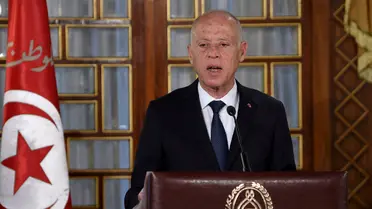Tunisian authorities have intensified their crackdown on political opposition, arresting dozens of members from the country’s largest opposition party, Ennahda, just days before the official start of the presidential election campaign, party officials and attorneys reported Friday.

Ennahda, an Islamist party that gained prominence following Tunisia’s 2011 Arab Spring revolution, stated that at least 80 of its members, including six women, had been detained in a nationwide sweep affecting 10 regions. The party’s attorney, Latifa Habbechi, said they were working to confirm up to 116 total arrests.
“This is an unprecedented campaign of raids and violations of the most basic rights guaranteed by law,” Ennahda said in a statement, characterizing the arrests as a severe blow to Tunisia’s fragile democracy.
Among those detained were high-ranking party officials, including Mohamed Guelwi, a member of Ennahda’s executive committee, and Mohamed Ali Boukhatim, a regional party leader from Ben Arous, a suburb of Tunis. Ahmed Gaaloul, a former Minister of Youth and Sports and advisor to imprisoned Ennahda leader Rached Ghannouchi, confirmed that arrests were continuing through Friday afternoon.

The mass detentions come amid a turbulent pre-election period in Tunisia, where President Kais Saied is widely expected to secure a second term due to political apathy and the imprisonment of prominent opposition figures. The election, scheduled for October 6, has been marred by controversy, with Saied recently dismissing the majority of his cabinet and authorities arresting more potential opponents.
Habbechi revealed that based on preliminary information, those arrested may face charges related to Tunisia’s anti-terrorism law. However, she noted that interrogations reportedly focused on the detainees’ political activities and their choice of candidate for the upcoming presidential election.

Significantly, about 90% of those arrested were individuals who had been previously incarcerated under former presidents Zine El Abidine Ben Ali and Habib Bourguiba, with 70% being over 60 years old. Many were involved in Tunisia’s transitional justice process, which addresses past human rights abuses.
The crackdown has extended beyond Ennahda, affecting other political figures and civil society members. Abdellatif Mekki, a former Health Minister and ex-Ennahda member now leading the Work and Accomplishment party, was arrested in July in connection with a 2014 murder investigation, which his attorneys claim is politically motivated.

“These arrests come as a sign of further narrowing and deviation of the electoral process, aiming at spreading fear and emptying the upcoming election of any chance for a real democratic competition,” Mekki’s party stated on Friday.
The wave of arrests has sparked protests in the capital, with hundreds of Tunisians demonstrating against what they perceive as the emergence of a police state. Human rights groups have expressed concern over the use of a controversial anti-fake news law to suppress criticism of the government.

As the official campaign season begins on Saturday, the international community is closely watching Tunisia’s political developments. The country, once hailed as the sole success story of the Arab Spring, now faces scrutiny over its commitment to democratic principles.
The upcoming election and the government’s actions in its lead-up are seen as a critical test for Tunisia’s democracy, with implications for political stability and human rights in the North African nation. As the situation unfolds, observers are questioning the fairness and transparency of the electoral process in light of the ongoing crackdown on opposition voices.
apnews.com



